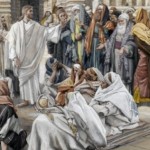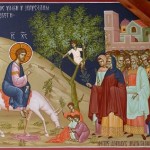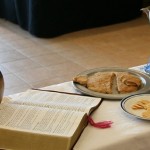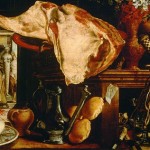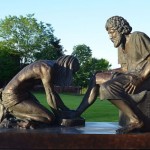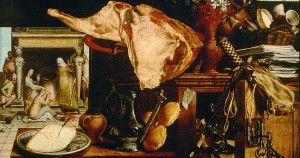 I love the family from Bethany! It was obvious how much the Lord loved them and how much they loved Him in return. In this love, both that which is received and that which is given, they are a picture of our lives lived in communion and love with the Holy Trinity. For whatever we have received from God we are required to give back in gratitude and love.
I love the family from Bethany! It was obvious how much the Lord loved them and how much they loved Him in return. In this love, both that which is received and that which is given, they are a picture of our lives lived in communion and love with the Holy Trinity. For whatever we have received from God we are required to give back in gratitude and love.
Before we turn to the picture of love, we must see the picture of selfishness and greed. Who better to portray the folly of our selfishness and greed than Judas Iscariot? Now like the family from Bethany, Jesus had given Judas something special. Like all of the 12 disciples, the greatest gift Judas had been given was the presence of the Lord Himself. Who among us wouldn’t give all we had to spend 3 short years living with Him, serving Him, and sitting at His feet?
Judas was given just such a priceless opportunity. In the end, He threw it all away to pursue his own selfish dreams. Having received Christ Himself, He did not give Him back to the Father but cast Him away. In a similar way, Jesus had entrusted Judas with His treasury, the money He and the disciples lived on. As happens so much with us, it’s the things we’re most gifted at that are most likely to become temptations by which we betray our Lord. I don’t think that anytime soon I’ll be throwing over my pastoral career to take up dancing (don’t look for me on Dancing with the Stars – maybe they can make a new show: “Writing Daily Bible Meditations with the Average Joe”).
Judas probably had a talent for finances and was in some ways probably a wise and capable steward. He instinctively calculated that the extraordinary sum of 300 denarii could feed many poor. What a waste it must have seemed to him! I’m sure he would have skimmed off his usual percentage, but I think he was probably genuinely offended by the “wastefulness” of it. But Judas’ respect for money and stewardship over it at some point in time grew into greed and idolatry. It would be interesting to speculate on how much this growing greed prepared the way for his greater betrayal of His Lord.
But from the family of Bethany we see how God’s gifts are to be returned to Him, blessed by having become a part of us and by our sacrificial parting with them in love.
Lazarus was given back his life by Jesus, and so what was it that Jesus especially required from him? His life! And so we find Lazarus sitting at the table at supper with the Lord. What better way to spend a life that had been redeemed and restored?! By living visibly as Jesus’ disciple, the life of Lazarus began to bless others who wanted to come and see the one who had been given new life and through him to see the One Who Gives New Life. Funny, that by giving up his life as a witness to the One Who Gives Life, Lazarus placed himself under the threat of death again, this time from the chief priests. But what force on earth could separate a resurrected one from His loving Lord?
The sad thing is that we, too, have been given back our lives. How much of our lives do we give back to the One Who Gives Us Life?
Martha had been served by Jesus Christ in her life, most noticeably in having the life of her beloved brother restored. Jesus served her by teaching her the meaning of the resurrection and life, and God had given Martha a heart to serve. So what was it that the Lord required of Martha? Her labor! Whenever Jesus came, and the many multitudes who followed Him, who do you think prepared the house and the meals? Martha! Can you imagine having a large number of people drop in on your house unexpectedly, one of them being the Lord Himself? What frantic preparations would then be undertaken. While Martha had been rebuked for not understanding Mary’s kind of love, this doesn’t mean that her own kind of love, the love of labor, was unacceptable, because we find her serving once again in Chapter 12.
In Luke 10, it was not so much that Martha served for which she is rebuked, but that she was distracted by it. What was she distracted from? From the Lord Himself, the Lord of Labor. Sometimes, we too, allow our labor for the Lord to gradually evolve into mere labor for labor’s sake, a syndrome we might call “Love Lost in Labor.” How sad when our labor is done without reference to the one who labored for us! Having learned the lesson of the resurrection and life, Martha may still not have been much good at the contemplative life; however, the labor the Lord gave her, she lovingly gave back.
Mary received a special love from the Lord, and so what was it that she gave back to Him in love? Love, of course! This is the Mary who earlier had sat at Jesus feet, beholding and hearing Him. Here we find her committing an act of extravagant love, as she empties the contents of a jar of expensive spikenard and anoints the feet of Jesus. These are the same feet where she sat, listening to, looking for, and learning love from the Master.
Mary’s love involved her possessions, for that perfume must have been very precious for her. She was probably saving it for a special personal reason and found the best and most personal reason in her Lord. Her love involved her wealth, for the spikenard was worth about a year’s wages. How much do you earn a year? What if you had carefully saved that much over the years and then, in one sudden act of worship, parted with it? Mary’s love also involved her body. She took the glory of her hair and with it wiped the cursed and dirty feet. With her entire body, she worshiped the Lord.
But how often do we take the love of our Lord and hoard it, in which case it disintegrates? Our Lord loved us with His Body, so much so that He allowed it to bleed and be broken for our bodies and souls. Our Lord loved our bodies so much that He has made us into His Body, and yet we refuse to wash the feet of the saints. Out of His love, He gave us a perfume much rarer and more valuable than spikenard: He gave us His Blood, the elixir of life so that, with Lazarus, we might be given back our life. And in love, He gave us of His riches, not mere denarii, but eternal riches, the most valuable and priceless one of all being life with Himself.
So, then, with Lazarus you have been given life; with Martha, you have been given labor; and with Mary, you have been given love. What will you do with these gifts? Who will you love and serve with them: the Lord – or yourself?
Prayer: O Lord Jesus Christ, who called people from their daily work, saying to them, “Come after me,” may I, your child, hear your voice today and gladly answer Your call to give my life, my labor, and my love back to You. May I love life, not for its own sake or for mine, but because I love You. May I love labor because You have hallowed it and by Your labor I was created and redeemed. May I love You because You have first loved me. Amen.
Point for Meditation:
- Imagine what it would have been like to have received new life, as Lazarus did. How can you use such a meditation to spur you to greater love for the Lord?
- Examine your attitude toward labor. Do you see it as mere drudgery or an evil necessity? Do you see it merely as the means by which you can enrich yourselves? What can you do to see more of the Lord in your labor?
- Do you spend adequate time gazing at the Lord and listening to Him?
Resolution: I resolve to consider one of the above Points for Meditation and to take one practical step toward what the Lord is asking me to do with my life, in my labor, or in love.
Christ with Mary and Martha – in U.S. Public Domain

